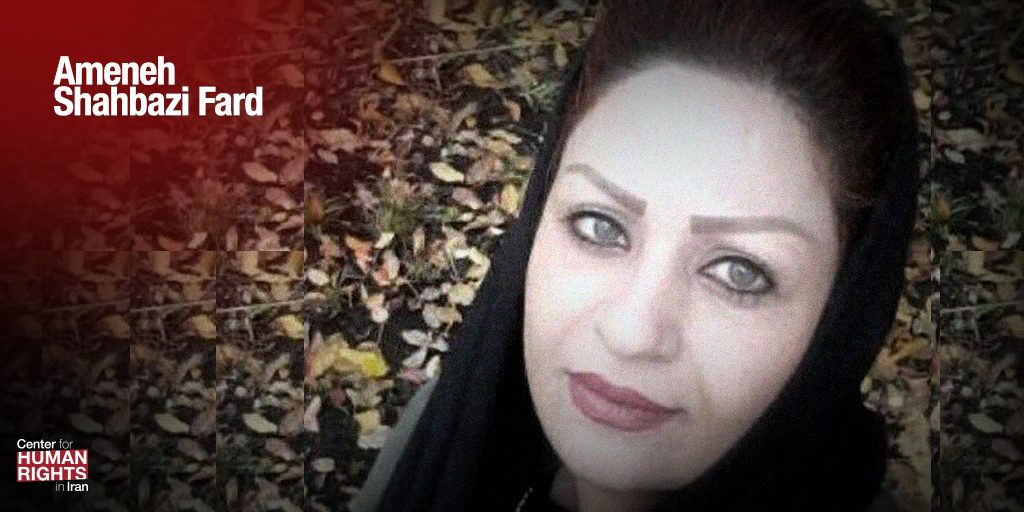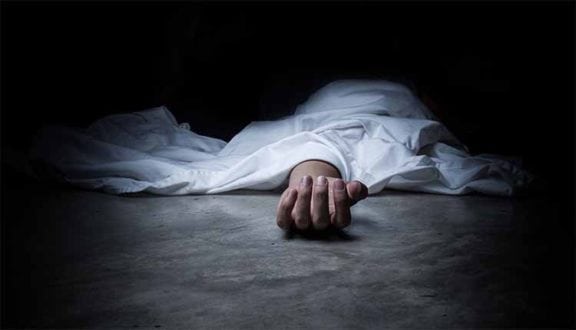CHRI – An unarmed civilian and mother of three young children, Ameneh Shahbazi, was killed by a bullet as she was trying to help a person shot in the leg during a protest, her brother, Mohammad Shahbazi, said in an interview with the Center for Human Rights in Iran (CHRI).

Her death certificate indicated that she had died from a shattered skull but in fact a bullet had broken her neck, Mohammad said.
The family was forced to pay in order to receive her body, and they were surrounded by security agents at her funeral.
As reports emerge from Iran since the state-imposed internet shutdown was lifted, the extent of the security forces’ unprecedented and unlawful use of lethal force against unarmed protestors is being revealed, as is the illegal withholding of bodies for payment.
The 34-year-old housewife had gone shopping when she encountered a protest against the increase in the price of gasoline in the Sarasiyab district of Karaj, west of Tehran, on the evening of Sunday, November 17.
This was one of the many protests that erupted across Iran in response to the November 15 price hike, which were followed by an unprecedented violent state response that has resulted in hundreds dead, with many more were injured and thousands arrested.
“My sister had gone to buy some medicine. On her way back, there was a commotion on Iranzamin Street and someone had been shot in the leg. Ameneh was attending to the man’s wound when she was hit by a bullet from behind. It happened at 9:00 pm. I was informed the following day,” Mohammad told CHRI.
“When I heard that she had been admitted to the State Welfare Organization hospital in Shahriar, I immediately drove to the hospital. But on the way, I got a call that she had died but her body was missing. They said she had been hit by a bullet.
“I picked up my mother and went looking for her. We found out that Ameneh’s body was at the Medical Examiner’s Office in Tehran. Her husband had identified her body. The prosecutor in Shahrar was not cooperative but we finally got a letter from him so that we could pick up Ameneh’s body. But the authorities at the Medical Examiner’s Office in Tehran threw away the letter and wouldn’t comply with the order. The Tehran prosecutor was there at the time. I begged and pleaded until they gave us her body.
“We took her body from the Medical Examiner’s Office to Beheshte Zahra Cemetery and we were told to come back the following day. On the way back home, we got a call from the cemetery telling us to come back. My mother, Ameneh’s husband, her mother-in-law, and I, went back. The officials at the cemetery told us the body wasn’t there. We begged them to look carefully. They told us to go to the morgue’s cold room. We went and they said she wasn’t there either. I got upset.
“Then the morgue supervisor came and he said the truth is that Ameneh’s body was there but an order had been given not to deliver the bodies of people who had been shot. He said he had to return the bodies to the authorities and they would make burial arrangements at some cemetery and then inform us a week later.
“We begged and pleaded and finally we were told to go and see Beheshte Zahra’s director. He told us we can’t take her body. We begged and cried and then he said, ‘How much can you pay?’ I said I have a fixed salary and don’t have a lot of money and Ameneh’s husband is a motorcycle messenger. He told us to wait there.”
Eventually, Mohammad added, the family had to pay 4.5 million tomans ($1,046 USD) in order to take Ameneh’s body.
“When we got her body, they told us we had paid less than what we were supposed to, which was 20 million tomans ($4,744 USD). I don’t know what the money was for. There were four or five people in the room [in Beheshte Zahra]. I don’t know who they were. I told them my sister was innocent. She had gone out to get medicine for her kids. One of the guys told me I shouldn’t make up stories…
“We were told not to talk to anyone during the funeral and to report anyone suspicious. They made me sign a pledge that there would not be a big crowd at the funeral. When we went to the assigned burial plot, there were a lot of agents. About 20.”
Mohammad added: “My sister had just returned from [a Shi’ite religious pilgrimage to] Karbala [in Iraq]. Our father was a retired senior police officer. On television, they constantly talk about police officers who were martyred by rioters and interview their little kids but they accuse people like my sister of being political rebels. My sister was good person, a housewife, who had not committed any crime. None of us have been to prison. We have not even been to court for anything…
“No one is taking responsibility. Who can we hold accountable? We have even been told not to talk about this to anyone. So how can I follow this matter? Who can I sue? We don’t know what to do.”
The Iranian government has so far not released numbers on those killed, injured or arrested, even amidst mounting calls for state accountability for violence both inside Iran and internationally.
 Shabtabnews In this dark night, I have lost my way – Arise from a corner, oh you the star of guidance.
Shabtabnews In this dark night, I have lost my way – Arise from a corner, oh you the star of guidance.



